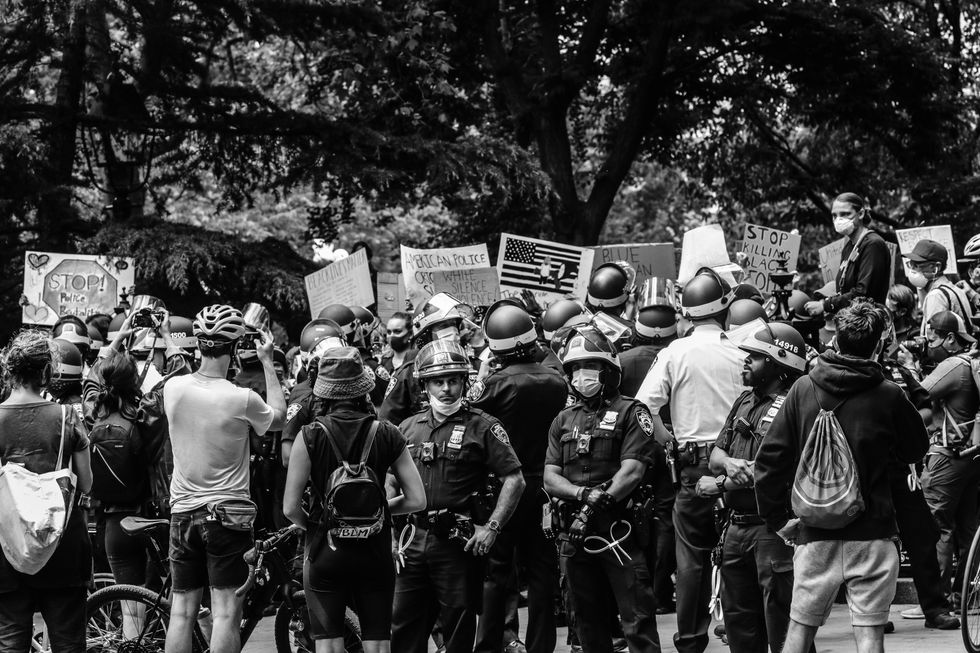When the War on Drugs was declared, it characterized drugs as America's number 1 enemy. At the time, the civil rights movement was about to face backlash, and poor, black neighborhoods were facing an economic depression. Oppressed black communities needed support from the government; they needed access to good schools, relief programs, and healthcare they could afford. Racism in American society had yet to be properly addressed. Despite these problems, the Clinton administration determined drug abuse as "public enemy number 1."
And so the war on drugs was waged; however, waged exclusively on a certain group of people.
Longer sentences were put on drugs common in urban populations, populations with more people of color. Headlines of stories where drugs were planted in black neighborhoods became common. Law enforcement rounded up millions of men, predominantly black men, for "drug related" crimes, and they cycled through our prisons. Now criminals, it was suddenly legal to take away their rights; right to vote, right to get a job, right to own a home. Those men, and today's men, have been permanently locked out of society, because when you're a criminal in America, you instantly lose your credibility. It is clear that the group of people impacted heavily by the drug war were black men. This new form of oppression still exists today.
A problem with America's law enforcement can be identified by simply consuming media, where on the news, criticizing our law enforcement is deemed a "leftist strategy." But it is clear law enforcement in the U.S is deeply flawed, so why can't we criticize it? To understand the impact of the War on Drugs, it may be helpful to observe how other countries dealt with similar problems.
For example, In 1993, Portugal completely decriminalized drugs.
In the 1990s, they were in the middle of a drug epidemic. Though drugs were a growing problem in the country, in 1993, a policy was introduced that completely changed Portugal's mindset. Drug users should no longer be punished. Instead, they should have easy access to programs and treatment. By decriminalizing drugs and not throwing people in jail, there became dramatically less drug usage in Portugal. This is because instead of drugs being treated as "the devil" they were understood as a problem with a perfectly attainable solution.
America never had a drug problem this severe, yet to this day, America uses drugs to justify harmful racist behavior, to give unusually long sentences to black Americans, and to cause permanent damage to poor black communities, as having a criminal record makes it nearly impossible to reenter completely into society.
The war on drugs, if anything, emphasized that the real problem we face in America is systemic racism.
In addition to decriminalizing drugs, Portugal also gave communities the resources they lacked, such as more programs, treatment, and free healthcare, so that everyone has equal access. Despite this also being a controversial topic in the U.S, this is an essential part of rebuilding communities, and is long overdue in the United States. Defunding the police is also seen as a radical and controversial idea, although it aims to minimize violence through reallocating excessive police funds that are not making communities any safer. These ideas should not been seen as so "leftist" and "radical."
By observing history and other countries such as Portugal, it is clear that the problems that lie within our law enforcement and communities cannot be solved by locking more people away in prison. They cannot be fixed with body cam regulations. They cannot be fixed with additional racial bias training, as racism is rooted deep within law enforcement. Deploring more officers to these communities cannot make them any "safer." This "law and order" will not fix the problems rooted deep in the United States.
Two Libson cops described their role as policemen in this American documentary. "Human dignity is the backbone of our society," one said. " And the laws have to be based on respecting and following that principle." The other nodded in agreement. "And those principles are instilled in us, even in our training as policemen. A basic principle in our training is the respect for the dignity of the human being. Always."






















